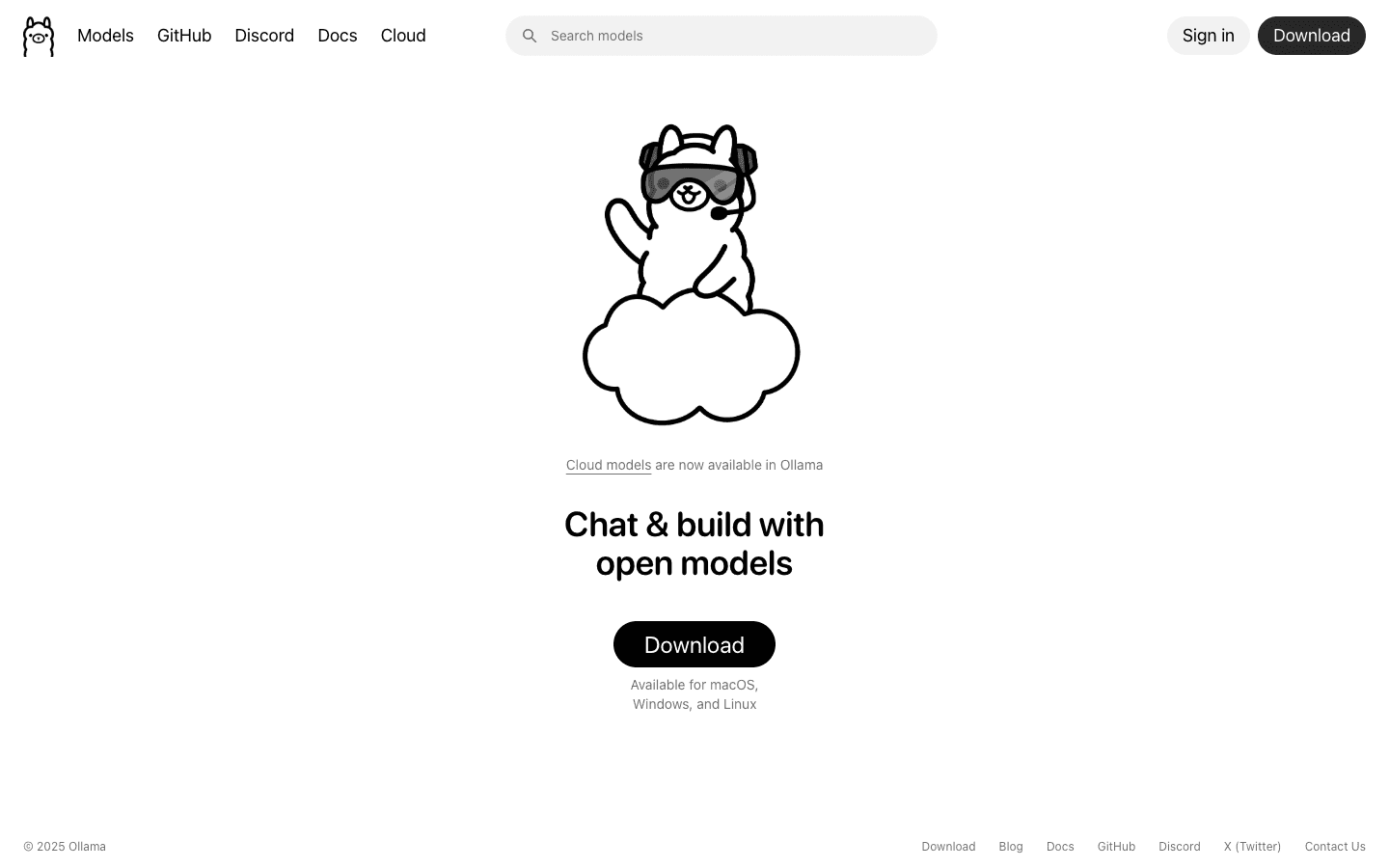
Ollama
Run and scale local and cloud LLMs with Ollama

Overview
Ollama (https://ollama.com/) is a developer-focused platform for running, customizing, and deploying open language models both locally and in the cloud. Designed for engineers, researchers, and product teams who need control over model selection, performance, and data privacy, Ollama provides a unified experience via a lightweight CLI, desktop app, REST API, and language SDKs.
You can download native clients for macOS, Windows, and Linux or connect programmatically via libraries like ollama-python, ollama-js, and community SDKs. At its core, Ollama makes it simple to pull models from an extensible model library, import GGUF or safetensors artifacts, and package model variants with a Modelfile. Modelfiles let you pin parameters, inject system messages, and create reproducible custom models that behave predictably in production and experimentation.
Run models locally when you need offline inference and maximum privacy, or use Ollama Cloud to access datacenter-grade GPUs, larger models, and faster response times while maintaining a privacy-first promise: Ollama does not retain queries in cloud service logs. The platform supports multimodal models, model management commands (pull, run, create, rm, cp), and a REST API for generate and chat endpoints, enabling integration into web apps, backend services, and robotics.
Community integrations span web UIs, VS Code and terminal plugins, observability tools, and RAG workflows via LangChain, LlamaIndex, and other connectors. Ollama also provides clear hardware guidance and system requirements for running popular model sizes, helping teams plan capacity for 7B, 13B, and larger models. What makes Ollama unique is the balance between local-first control and optional cloud scale.
Teams get developer-grade tooling for prompt customization, reproducible Modelfiles, an active open-source community on GitHub and Discord, and the option to burst into Ollama Cloud for performance and larger-model capabilities. Whether you are experimenting with Gemma, Llama variants, or custom imported GGUF models, Ollama unifies model lifecycle, deployment, and observability in a privacy-conscious workflow.
Core Features
- Run models locally or on Ollama Cloud for flexible deployment
- Create reproducible Modelfiles to customize prompts and parameters
- CLI-first workflow with desktop apps for macOS, Windows, Linux
- REST API and SDKs (Python, JavaScript, community libraries)
- Import GGUF and safetensors models to extend the library
- Multimodal support for image and text prompts
- Privacy-first cloud: no query retention and enterprise-ready controls
Use Cases
- Local development of chatbots and agent prototypes on developer machines
- Deploying RAG pipelines for searchable knowledge bases in enterprises
- Offline on-device assistants for privacy-sensitive applications
- Code generation and repo analysis integrated in CI pipelines
- Academic research running replicated experiments with Modelfiles
- Customer support automation using tailored, self-hosted models
- Multimodal image plus text analysis for content moderation
- Content generation and editing for marketing teams, locally hosted
- Scaling inference for heavy workloads using Ollama Cloud
- Embedding and semantic search workflows with LangChain integrations
Pros & Cons
Pros
- Run models locally for full data privacy
- Modelfile-driven reproducible custom models
- Supports GGUF and safetensors imports
- CLI and desktop apps for cross-platform workflows
- REST API for easy backend integration
- Large community and many third-party integrations
- Optional Ollama Cloud for faster inference
- Multimodal model support
- Broad model library including Gemma and Llama variants
- Lightweight footprint for developer experimentation
- Extensive SDK and library ecosystem
Cons
- Large models require significant RAM and GPU
- Cloud metering and advanced billing evolving
- Setup has a learning curve for non-developers
- Some integrations are community-maintained
- Enterprise SLAs may require custom agreements
- Offline inference limited by local hardware
FAQs
Video Review
Ollama Alternatives
Featured

Kimi AI
Kimi AI - K2 chatbot for long-context coding and research

Genspark AI
Your All-in-One AI Workspace

Winston AI
The most trusted AI detector

TurboLearn AI
AI Note Taker & Study Tools

Blackbox AI
Accelerate development with Blackbox AI's multi-model platform

Un AI my text
“Where AI Gets Its Human Touch.”

Hailuo AI
AI Video Generator from Text & Image

Sora 2
Transform Ideas into Stunning Videos with Sora 2

Abacus AI
The World's First Super Assistant for Professionals and Enterprises

ChatGPT Atlas
The browser with ChatGPT built in

Animon AI
Create anime videos for free

AI PDF Assistant
AI PDF Assistant is an intelligent recommendation tool

